Prophylactic and therapeutic potential of vitamin D in asthma during the COVID-19 pandemic: the new hope?
Over the last two decades, the emergence of lethal virulent strains of coronavirus (CoV), including the severe acute respiratory syndrome CoV 2 (SARS-CoV-2), which is responsible for the coronavirus
[...] Read more.
Over the last two decades, the emergence of lethal virulent strains of coronavirus (CoV), including the severe acute respiratory syndrome CoV 2 (SARS-CoV-2), which is responsible for the coronavirus disease 2019 (COVID-19) pandemic, has become a matter of great attention to the scientific community. Despite the implementation of preventive measures throughout the world, the spread of this disease and associated co-morbidities and mortality continue in all countries, continents, and populations of all ages. COVID-19 is highly contagious. Clinical manifestations are diverse and range from asymptomatic, mild to severe, life-threatening complications in the elderly and patients with underlying conditions such as cardiovascular disease, diabetes, obesity, and asthma. In addition, viral infections can trigger asthma attacks. To date, there is no specific treatment schema to combat COVID-19 disease. Current patient care revolves around disease severity and supportive treatment of symptoms from home-rest in mild disease to anti-viral therapy, oxygen support, anti-inflammatories, and anti-coagulants in severe COVID-19. Regarding prevention, the World Health Organization recommends vaccination, social distancing, quarantine, the wearing of surgical masks, and handwashing. In many countries, vaccination is optional, and given that parents are often reluctant to vaccinate themselves and their children for fear of side effects, identifying ways to enhance or support the immune system to prevent infection or improve recovery in vulnerable populations is worth investigating. Furthermore, research has focused on the pharmacological management of COVID-19 symptoms and much less has been published on nutrition therapy. Therefore, the scope of this review is to summarize the latest evidence on the use of vitamin D to support the metabolism and the immune system of asthma patients during the COVID-19 pandemic. A brief overview of asthma and COVID-19 pathophysiology, COVID-19 treatment guidelines for asthma patients, and the role of vitamin D in lung health, including the optimal blood level required to enhance immunity, will be suggested.
Maria Michelle Papamichael, Charis Katsardis
View:594
Download:13
Times Cited: 0
Over the last two decades, the emergence of lethal virulent strains of coronavirus (CoV), including the severe acute respiratory syndrome CoV 2 (SARS-CoV-2), which is responsible for the coronavirus disease 2019 (COVID-19) pandemic, has become a matter of great attention to the scientific community. Despite the implementation of preventive measures throughout the world, the spread of this disease and associated co-morbidities and mortality continue in all countries, continents, and populations of all ages. COVID-19 is highly contagious. Clinical manifestations are diverse and range from asymptomatic, mild to severe, life-threatening complications in the elderly and patients with underlying conditions such as cardiovascular disease, diabetes, obesity, and asthma. In addition, viral infections can trigger asthma attacks. To date, there is no specific treatment schema to combat COVID-19 disease. Current patient care revolves around disease severity and supportive treatment of symptoms from home-rest in mild disease to anti-viral therapy, oxygen support, anti-inflammatories, and anti-coagulants in severe COVID-19. Regarding prevention, the World Health Organization recommends vaccination, social distancing, quarantine, the wearing of surgical masks, and handwashing. In many countries, vaccination is optional, and given that parents are often reluctant to vaccinate themselves and their children for fear of side effects, identifying ways to enhance or support the immune system to prevent infection or improve recovery in vulnerable populations is worth investigating. Furthermore, research has focused on the pharmacological management of COVID-19 symptoms and much less has been published on nutrition therapy. Therefore, the scope of this review is to summarize the latest evidence on the use of vitamin D to support the metabolism and the immune system of asthma patients during the COVID-19 pandemic. A brief overview of asthma and COVID-19 pathophysiology, COVID-19 treatment guidelines for asthma patients, and the role of vitamin D in lung health, including the optimal blood level required to enhance immunity, will be suggested.
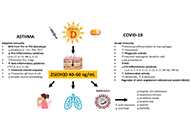 Prophylactic and therapeutic potential of vitamin D in asthma during the COVID-19 pandemic: the new hope?Open AccessReviewOver the last two decades, the emergence of lethal virulent strains of coronavirus (CoV), including the severe acute respiratory syndrome CoV 2 (SARS-CoV-2), which is responsible for the coronavirus [...] Read more.Maria Michelle Papamichael, Charis KatsardisPublished: June 27, 2024 Explor Asthma Allergy. 2024;2:245–286
Prophylactic and therapeutic potential of vitamin D in asthma during the COVID-19 pandemic: the new hope?Open AccessReviewOver the last two decades, the emergence of lethal virulent strains of coronavirus (CoV), including the severe acute respiratory syndrome CoV 2 (SARS-CoV-2), which is responsible for the coronavirus [...] Read more.Maria Michelle Papamichael, Charis KatsardisPublished: June 27, 2024 Explor Asthma Allergy. 2024;2:245–286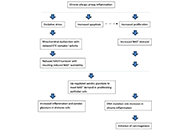 Metabolic adaption of epithelial cells in asthma: a window to the initiation of carcinogenesis?Open AccessReviewRecent data has resulted in an interest in the metabolic shift in cellular metabolism to aerobic glycolysis, increased reactive oxygen species (ROS), and mitochondrial dysfunction associated with as [...] Read more.Thomas DymondPublished: June 12, 2024 Explor Asthma Allergy. 2024;2:233–244
Metabolic adaption of epithelial cells in asthma: a window to the initiation of carcinogenesis?Open AccessReviewRecent data has resulted in an interest in the metabolic shift in cellular metabolism to aerobic glycolysis, increased reactive oxygen species (ROS), and mitochondrial dysfunction associated with as [...] Read more.Thomas DymondPublished: June 12, 2024 Explor Asthma Allergy. 2024;2:233–244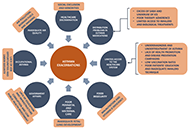 How to implement the anti-inflammatory reliever treatment proposed by the Global Initiative for Asthma in low- and middle-income countriesOpen AccessReviewThere are no plausible arguments to consider that the best evidence-based asthma treatment should be different in low- and middle-income countries (LMICs). A few decades ago, the recognition of asth [...] Read more.Carlos A. Torres-Duque ... Abraham Alí-MunivePublished: June 12, 2024 Explor Asthma Allergy. 2024;2:219–232
How to implement the anti-inflammatory reliever treatment proposed by the Global Initiative for Asthma in low- and middle-income countriesOpen AccessReviewThere are no plausible arguments to consider that the best evidence-based asthma treatment should be different in low- and middle-income countries (LMICs). A few decades ago, the recognition of asth [...] Read more.Carlos A. Torres-Duque ... Abraham Alí-MunivePublished: June 12, 2024 Explor Asthma Allergy. 2024;2:219–232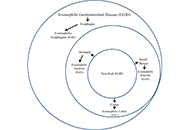 Eosinophilic gastrointestinal diseases: current perspectives on pathogenesis and managementOpen AccessReviewEosinophilic gastrointestinal diseases (EGIDs) are a group of chronic conditions, characterized by an excessive accumulation of eosinophils in various areas of the mucosal of the gastrointestinal (G [...] Read more.Georgia Papaiakovou ... Nikoletta RovinaPublished: June 07, 2024 Explor Asthma Allergy. 2024;2:205–218
Eosinophilic gastrointestinal diseases: current perspectives on pathogenesis and managementOpen AccessReviewEosinophilic gastrointestinal diseases (EGIDs) are a group of chronic conditions, characterized by an excessive accumulation of eosinophils in various areas of the mucosal of the gastrointestinal (G [...] Read more.Georgia Papaiakovou ... Nikoletta RovinaPublished: June 07, 2024 Explor Asthma Allergy. 2024;2:205–218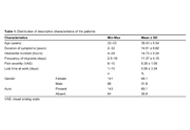 Relation of sinonasal anatomic variants with the frequency, pain severity and time off work in patients with migraineOpen AccessOriginal ArticleAim: Chronic migraine (CM) is a condition characterized by attacks of severe headaches leading to an increase in time off work, decrease in work productivity and in physical functioning. The aim [...] Read more.Ayşegül Verim ... Tuğba ÇelikPublished: June 06, 2024 Explor Asthma Allergy. 2024;2:195–204
Relation of sinonasal anatomic variants with the frequency, pain severity and time off work in patients with migraineOpen AccessOriginal ArticleAim: Chronic migraine (CM) is a condition characterized by attacks of severe headaches leading to an increase in time off work, decrease in work productivity and in physical functioning. The aim [...] Read more.Ayşegül Verim ... Tuğba ÇelikPublished: June 06, 2024 Explor Asthma Allergy. 2024;2:195–204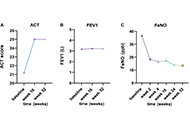 Dupilumab treatment for severe chronic rhinosinusitis with nasal polyps: efficacy and impact on co-existing mild to moderate asthmaOpen AccessOriginal ArticleAim: This study aims at assessing dupilumab’s response in severe chronic rhinosinusitis with nasal polyps (CRSwNP) and its impact on concurrent mild to moderate asthma. Methods: The study [...] Read more.Niki Papapostolou, Michael MakrisPublished: June 06, 2024 Explor Asthma Allergy. 2024;2:186–194
Dupilumab treatment for severe chronic rhinosinusitis with nasal polyps: efficacy and impact on co-existing mild to moderate asthmaOpen AccessOriginal ArticleAim: This study aims at assessing dupilumab’s response in severe chronic rhinosinusitis with nasal polyps (CRSwNP) and its impact on concurrent mild to moderate asthma. Methods: The study [...] Read more.Niki Papapostolou, Michael MakrisPublished: June 06, 2024 Explor Asthma Allergy. 2024;2:186–194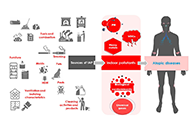 Indoor air pollution and atopic diseases: a comprehensive frameworkOpen AccessReviewIndoor air pollution (IAP) is an important cause of concern for human health, leading to millions of deaths worldwide each year. Since people spend most of their time indoor the quality of the air i [...] Read more.Erminia Ridolo ... Francesca NicolettaPublished: May 31, 2024 Explor Asthma Allergy. 2024;2:170–185
Indoor air pollution and atopic diseases: a comprehensive frameworkOpen AccessReviewIndoor air pollution (IAP) is an important cause of concern for human health, leading to millions of deaths worldwide each year. Since people spend most of their time indoor the quality of the air i [...] Read more.Erminia Ridolo ... Francesca NicolettaPublished: May 31, 2024 Explor Asthma Allergy. 2024;2:170–185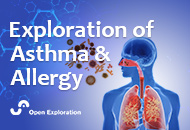 Renewing the Australian asthma agenda: lessons from the Finnish 10-year Asthma ProgramOpen AccessReviewThe Finnish Asthma Program, which ran between 1994 and 2004, has long been heralded as a benchmark of success in how to improve management and reduce asthma-related health service utilization. In Au [...] Read more.Kristin Carson-Chahhoud ... Tari HaahtelaPublished: May 20, 2024 Explor Asthma Allergy. 2024;2:161–169
Renewing the Australian asthma agenda: lessons from the Finnish 10-year Asthma ProgramOpen AccessReviewThe Finnish Asthma Program, which ran between 1994 and 2004, has long been heralded as a benchmark of success in how to improve management and reduce asthma-related health service utilization. In Au [...] Read more.Kristin Carson-Chahhoud ... Tari HaahtelaPublished: May 20, 2024 Explor Asthma Allergy. 2024;2:161–169